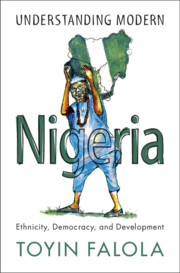Book contents
- Understanding Modern Nigeria
- Understanding Modern Nigeria
- Copyright page
- Dedication
- Contents
- Figures
- Maps
- Preface
- Acknowledgments
- Part I Introduction
- Part II Context and History
- Part III Democracy and Governance
- Part IV Development Crises
- 11 Corruption
- 12 The Political Economy of Oil
- 13 Environment and Sustainable Development
- 14 Food, Society, and Human Capabilities
- 15 Women’s Marginalization
- 16 Human and Minority Rights
- 17 Political Violence
- 18 Challenges of Western Education
- Part V Reforms and Revolutions
- Part VI Conclusion
- Bibliography
- Index
18 - Challenges of Western Education
from Part IV - Development Crises
Published online by Cambridge University Press: 09 June 2021
- Understanding Modern Nigeria
- Understanding Modern Nigeria
- Copyright page
- Dedication
- Contents
- Figures
- Maps
- Preface
- Acknowledgments
- Part I Introduction
- Part II Context and History
- Part III Democracy and Governance
- Part IV Development Crises
- 11 Corruption
- 12 The Political Economy of Oil
- 13 Environment and Sustainable Development
- 14 Food, Society, and Human Capabilities
- 15 Women’s Marginalization
- 16 Human and Minority Rights
- 17 Political Violence
- 18 Challenges of Western Education
- Part V Reforms and Revolutions
- Part VI Conclusion
- Bibliography
- Index
Summary
The society is often a fragmented space of ideas and ideals only harmonized by the agency of collective knowledge, tested, disseminated, and established as an episteme through its educational system. Ideally, the nature of a society usually informs the system and structure of its educational institution. Hence, Nigeria, like every other modern state, has moved through different trajectories that have altered the frame of the institution. The purpose of this paper is therefore propelled by the need to assess how those trajectories have affected the nature of the educational system of a West African country and its society. With the power and agency of colonially introduced Western education still reverberating in the modern state, the chapter taps myriad existing literature on Western education in Africa, Nigeria in particular, to reiterate the need for the decolonization of the Nigerian educational system. To this extent, it concludes on the unarguable note of rethinking Western education and its essence in the country for national cohesion and culture.
- Type
- Chapter
- Information
- Understanding Modern NigeriaEthnicity, Democracy, and Development, pp. 434 - 448Publisher: Cambridge University PressPrint publication year: 2021

